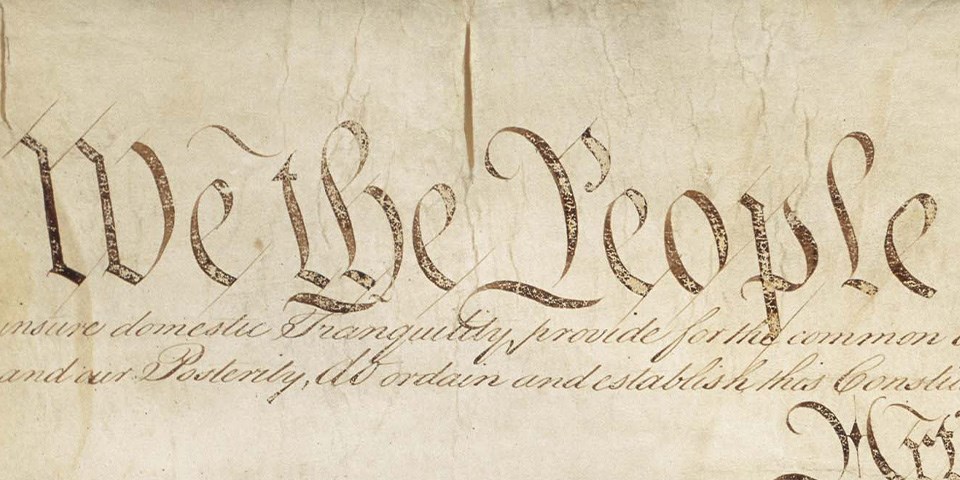Part of a series of articles titled The Constitutional Convention: A Day by Day Account for July 16 to 31, 1787.
Article
July 20, 1787: Impeachment

National Archives
"This Magistrate is not the King, but the prime minister. The people are the King."
--Gouverneur Morris
As today's session opened, the Convention, after some maneuvering, approved the proposal to elect the national executive by 25 electors apportioned among the states.
Charles Pinckney (SC) and Gouverneur Morris (PA) moved that the national executive should not be subject to impeachment since impeachment would lessen their independence from the legislature.
Davie (NC), Wilson (PA), Mason (VA), Franklin (PA), Madison (VA), Gerry (MA), and Randolph (VA) all spoke against C. Pinckney and G. Morris’s motion.
Franklin thought impeachment would be to the executive’s advantage. Without impeachment, the only way to remove a corrupt national executive would be assassination. With impeachment, the national executive would get a trial. If he was guilty, the punishment would be removal from office, not death. If he was innocent, then he would be exonerated, and his administration would no longer be tainted by scandal.
Regarding impeachments, Gerry quipped, “A good magistrate will not fear them. A bad one ought to be kept in fear of them.”
Madison gave numerous examples of situations where the national executive should be impeachable:
- “He might lose his capacity after his appointment.”
- “He might pervert his administration into a scheme of peculation or oppression.”
- “He might betray his trust to foreign powers.”
Mason feared a scenario where the national executive might gain office by corrupt means. Randolph described the hypothetical he feared: “The Executive will have great opportunities of abusing his power; particularly in time of war, when the military force, and in some respects the public money, will be in his hands.”
Facing these arguments, G. Morris admitted that there were limited circumstances where impeachment might be valuable, but he thought that the number of impeachable offenses should be specifically listed and precisely defined.
King (MA) cited the longstanding principle that the three branches of government (legislative, executive, and judicial) “should be separate and independent.” Letting the legislature impeach the national executive “would be destructive of his independence, and of the principles of the Constitution.”
In the end, G. Morris’s opinion changed, and he started arguing against the motion he had made at the beginning of the day. He now thought the executive should be impeachable for “treachery, corrupting his Electors, and incapacity.” He still wanted the legislature to be kept out of the impeachment process.
The Convention voted 8–2, Massachusetts and South Carolina opposed, to have the national executive be removable by impeachment.
Without debate, the Convention then voted unanimously for the national executive to have a fixed salary.
- The delegates agreed to have the national executive be chosen by electors apportioned among the states.
- Some delegates didn’t want the national executive to be impeachable, fearing that this would give the legislature too much power.
- Ultimately, the delegates who spoke in favor of impeachment were so persuasive that they changed the mind of Gouverneur Morris (PA), one of the most outspoken backers of a strong national executive.
- By an 8–2 margin, the Convention voted to make the national executive impeachable.
- Washington (PA) dined at home, drank tea at Clymer’s (PA), and placed an order with a Philadelphia blacksmith for a weathervane for his home. He requested that it be in the shape of a bird with an olive branch in its beak.
- Hamilton (NY), acting as a second to John Auldjo, who had been challenged by William Pierce (GA) to a duel, wrote Delaware Congressman Nathaniel Mitchell, Pierce's second, attempting to come to an agreement forestalling the duel. Hamilton also wrote Pierce, either this day or a few days later, enclosing, apparently, an explanation from Auldjo, and urging Pierce to accept it.
- The American Philosophical Society elected new members, including physician Caspar Wister, war veteran John Bayard, military engineer Jonathan Williams of Boston (Franklin’s grandnephew), English naturalist Sir Joseph Banks, Scottish surgeon John Hunter, and English Unitarian minister Thomas Barnes.
Last updated: September 21, 2023
